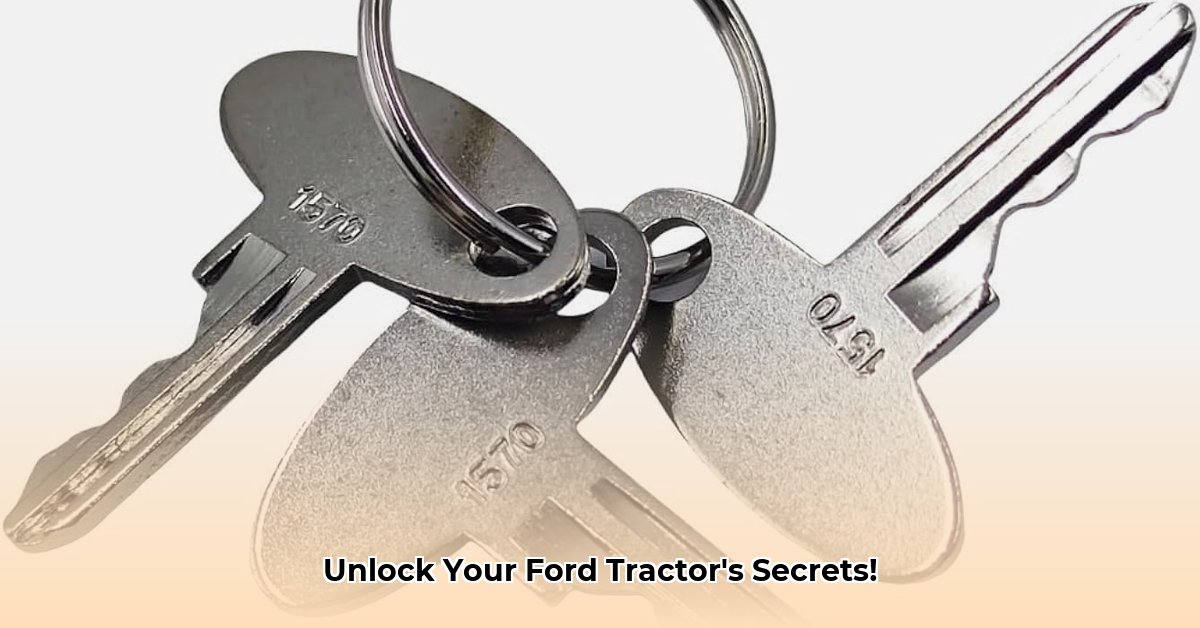
Your Ford tractor is your livelihood, and a malfunctioning key can bring operations to a standstill. This guide provides actionable solutions for common Ford tractor key problems, from lost keys to faulty key fobs. We'll cover various key types, troubleshooting steps, maintenance tips, and when professional help is necessary. For more information on classic Ford tractors, see this helpful resource: Ford 8N resources.
Identifying Your Ford Tractor Key Type
Understanding your key type is crucial for effective troubleshooting. Ford tractors utilize different key systems:
- Standard Metal Key: The simplest type, easily replaceable by a locksmith or dealer.
- Transponder Key: Resembles a standard key but contains an embedded microchip that communicates with the tractor's ignition system. Requires programming for operation.
- Smart Key (Key Fob): Features remote locking/unlocking functionalities through integrated electronics and buttons. More complex to repair or replace.
Examine your key closely. A visible microchip signifies a transponder key; buttons indicate a smart key. Your owner's manual provides definitive key system identification.
Troubleshooting Common Ford Tractor Key Issues
Let's address frequently encountered problems:
1. Lost or Stolen Keys: Replacing lost keys, especially transponder or smart keys, often requires a Ford dealership. They possess the specialized equipment to program the new key to your tractor’s system. While a locksmith may handle standard keys, dealerships are the preferred choice for complex keys due to their expertise and programming capabilities. Expect higher costs for transponder or smart key replacements.
2. Key Programming (Transponder Keys): Programming a transponder key requires specialized equipment and knowledge usually only available at a Ford dealership. Attempting DIY programming without expertise can cause more harm than good, potentially damaging your tractor's electronic systems. The cost of professional programming varies based on your tractor model and dealership location.
3. Broken or Damaged Keys: Minor key damage might be repairable using a key file (exercise caution!). However, extensive damage necessitates replacement. This is often simpler and safer than attempting repair, minimizing risk of further harm to your ignition system.
4. Key Fob Issues (Smart Keys): If your smart key's remote functions malfunction, begin by checking the battery. Replacing a depleted battery is a low-cost fix. Persistent issues may indicate internal electronic failure, necessitating professional repair or replacement.
5. Ignition Switch Problems: If none of your keys operate, the problem may lie within the ignition switch itself, not the key. This requires professional diagnosis and repair by a qualified technician. Diagnosing this issue incorrectly can lead to unnecessary key replacements and higher costs.
Ford Tractor Key Maintenance: Extending Key Lifespan
Proactive key maintenance extends its lifespan. Store your key in a cool, dry place, away from direct sunlight and moisture. Regularly clean the key with a damp cloth to remove dirt and debris. This simple practice helps prevent corrosion and ensures optimal key functionality.
DIY vs. Professional Help: A Cost-Benefit Analysis
While simple metal key replacements are often feasible DIY projects, transponder or smart keys require professional attention due to their electronic components. The following table summarizes the advantages and disadvantages of each approach:
| Method | Pros | Cons |
|---|---|---|
| DIY | Potentially cost-effective, immediate fix | Risk of damage, limited success for complex keys |
| Dealership | Guaranteed programming and repair; expertise | Higher cost, potential scheduling delays |
| Locksmith | May be faster for simple keys | Limited capability with complex key systems |
Choosing the correct approach depends on your key type, mechanical skill, and risk tolerance. Complex keys should always be handled by qualified professionals.
Safety Precautions: Prioritizing Safety
Always prioritize safety! Before working on the ignition system, disconnect the tractor battery to prevent electrical shocks. Never force a key, as this could damage both the key and the ignition switch. Consult your owner's manual for detailed safety information related to your tractor model. When in doubt, seek professional help to ensure safe and effective repairs.
Resources and Next Steps
Your local Ford dealership is the primary resource for key issues. Consult your owner's manual for model-specific information. Online forums dedicated to agricultural equipment and tractor repair can offer valuable insights from experienced users. Remember, prioritize safety and operational efficiency.